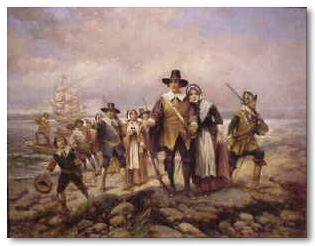Up or Down
- CHARLES COLSON
Never before in American history have judges been filibustered.
 |
Many of us tend to think of the first Thanksgiving feast as the official end to all the Pilgrims' difficulties. Wrong: Their survival would remain in jeopardy for years to come. And yet, no matter how difficult things became, they never failed to offer thanks to God.
As every school child knows, the Pilgrims arrived in the New World in the winter of 1620. As the freezing weeks passed, nearly half their number died. It was a terrible time, but by spring, things began to improve. Friendly Indians helped the Pilgrims plant their crops. By October 1621, the fields yielded a harvest large enough to sustain the colony in the coming winter. The grateful Pilgrims invited their Indian friends to a three-day feast of thanksgiving to God.
That's where the story typically ends — for us. But for the Pilgrims, the hardships went on. The next month, a ship arrived with thirty-five new colonists. But to the Pilgrims' dismay, they brought no provisions. The entire colony was forced to go on half rations that winter. At one point, with food running out, everyone was forced onto a daily ration of just five kernels of corn.
As my friend Barbara Rainey writes in her book, Thanksgiving: A Time to Remember, by spring, the colony was weakened by hunger and sickness. While the bay and creeks were full of fish, the Pilgrims' nets had rotted. Were it not for shellfish, which could be dug by hand, they would have perished. Despite the great difficulties, they thanked God for His provision.
Another Thanksgiving feast was arranged, and again the Indians took part. As Winslow wrote, "Another solemn day was set apart . . . wherein we returned glory, honor, and praise, with all thankfulness to our God who dwelt so graciously with us." |
More ships arrived that year, usually bringing newcomers with no supplies. Pilgrim father William Bradford wrote in his journal that, given the poor harvest, it "appeared that famine must still ensue the next year also."
By April 1623, the conditions were desperate. The Pilgrims planted double the corn of the previous year, only to see a drought several weeks long threaten the precious crop. In response, the Pilgrims held a day of fasting and prayer, asking God for rain. Pilgrim father Edward Winslow wrote that by evening, "The weather was overcast, [and] the clouds gathered on all sides." It was the beginning of two weeks of rainfall. The crop was saved, and that fall, the harvest was abundant. Another Thanksgiving feast was arranged, and again the Indians took part. As Winslow wrote, "Another solemn day was set apart . . . wherein we returned glory, honor, and praise, with all thankfulness to our God who dwelt so graciously with us."
They prayed this, remember, at the end of two terrible years filled with famine, hard work, and the loss of many loved ones.
As we gather with our families to celebrate our blessings, we ought to remember what happened to the Pilgrims after the feasting was over. Their steadfast trust in God is a reminder that we, too, need to trust in God, even in the most difficult circumstances — and thank Him.
May God bless you and yours this Thanksgiving.
This commentary first aired on November 24, 2005.
For further reading and information:
Barbara Rainey, Thanksgiving: A Time to Remember (Crossway, 2003).
Ellen Vaughn, Radical Gratitude (Zondervan, 2005).
Eric Metaxas, Squanto and the Miracle of Thanksgiving (Thomas Nelson, 1999).
BreakPoint Commentary No. 051103, “‘Having Undertaken for the Glory of God’: The Mayflower Compact.”
BreakPoint Commentary No. 061123, “‘God’s Instrument’: The Story of Squanto.”
Read portions of Governor William Bradford’s journal.
Anne Morse, “A Willful Forgetting: America Still Owes Gratitude for What the Lord Has Done,” BreakPoint Online, 23 November 2005.
 This is Meaghen Gonzalez, Editor of CERC. I hope you appreciated this piece. We curate these articles especially for believers like you.
This is Meaghen Gonzalez, Editor of CERC. I hope you appreciated this piece. We curate these articles especially for believers like you.
Please show your appreciation by making a $3 donation. CERC is entirely reader supported.

Acknowledgement
Charles Colson. "What Happened AFTER the Feast." BreakPoint Commentary November 24, 2006.
The Author

 Charles Colson (1931-2012) was an Evangelical Christian leader who founded Prison Fellowship and Breakpoint. Prison Fellowship has flourished into a U.S. ministry of 50,000 volunteers and has spread to more then 50 countries. Beyond his prison ministry, Colson was a Christian author, speaker, and commentator, who regularly confronted contemporary values from a biblically informed perspective. He wrote 15 books, including The Faith: Given Once, For All What Christians Believe, Why They Believe It, and Why It Matters, God & Government, Loving God, Answers to Your Kids' Questions, The Line Between Right & Wrong: Developing a Personal Code of Ethics, Against the Night: Living in the New Dark Ages, and How Now Shall We Live: A Study Guide.
Charles Colson (1931-2012) was an Evangelical Christian leader who founded Prison Fellowship and Breakpoint. Prison Fellowship has flourished into a U.S. ministry of 50,000 volunteers and has spread to more then 50 countries. Beyond his prison ministry, Colson was a Christian author, speaker, and commentator, who regularly confronted contemporary values from a biblically informed perspective. He wrote 15 books, including The Faith: Given Once, For All What Christians Believe, Why They Believe It, and Why It Matters, God & Government, Loving God, Answers to Your Kids' Questions, The Line Between Right & Wrong: Developing a Personal Code of Ethics, Against the Night: Living in the New Dark Ages, and How Now Shall We Live: A Study Guide.


